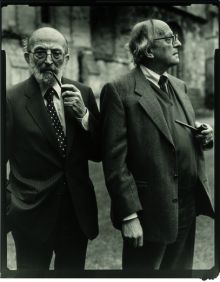Buy or gift a stand-alone digital subscription and get unlimited access to dozens of back issues for just £18.99 / $18.99 a year.
Please register at www.exacteditions.com/digital/cornucopia with your subscriber account number or contact subscriptions@cornucopia.net
Buy a digital subscription Go to the Digital Edition
The late David Barchard, who tragically died in York on Christmas Day, 2020, after a walking accident two days earlier, was the Financial Times correspondent in Turkey during the 1980s and has travelled widely in Turkey.
A former member of the Council of the British Institute of Archaeology at Ankara and the UK Turkish Area Study Group, he was also an authority on the Byzantine rock monasteries of Cappadocia and in 1995 helped rediscover the late Roman Village of Sykeon near Beypazari in Ankara province. In recent years he had been writing a set of studies of Turkish-European relations over the last two hundred years, including the Eastern Question and Turcophobia, and he lectured widely on Turkish politics and economics as well as late Ottoman history.
He was the author of Asil Nadir and the Rise and Fall of Polly Peck, three monographs on Turkish-European relations in the late twentieth century, and a so far unpublished study of the last century of Cretan history and the Cretan Muslims under Ottoman rule.
His book Land of Lakes: The Rebirth of Southeastern Anatolia is available from our online store
Also see:
https://independentscholar.academia.edu/thisisntmyurl
https://dergipark.org.tr/tr/pub/tws/issue/57506/811799


David Barchard on the ‘blurring of the lines between football and politics’, and Şevket Pamuk’s ‘lucid and immensely useful account of the country’s economic growth over the past 200 years’




Plucked from obscurity to become minister of war seven times, Hasan Riza Pasha is ignored by British and Turkish historians alike. Yet he deserves credit for his role in crucial reforms that prevented the collapse of the Ottoman Empire. David Barchard on a forgotten force behind the throne.


Byzantine books: essential reading by David Barchard

Few statesmen of the turbulent last years of the Ottoman Empire can have held more illustrious titles – at a less auspicious time – than the diminutive Küçük Said Pasha. David Barchard looks back over the eventful and chequered career of a man of many parts

Both were ambitious men with a penchant for poetry who suffered extremes of fortune. David Barchard charts the ties between two dominant figures in nineteenth-century Turkey, the British Ambassador Stratford Canning, and the Ottoman sultan Mahmut II

Until the 20th century, visitors would sail serenely into Istanbul to disembark opposite the Topkapi. After this spectacular start, reality would set in

David Barchard on the momentous events one hundred years ago when one devastating Balkan War led to a second, threatening the very existence of Istanbul

As Bursa lay in ruins after the earthquake of 1855, the man the Sultan sent to rescue the city was Ahmed Vefik Pasha. A brilliant man of letters, champion of Ottoman causes and very undiplomatic diplomat, he was to leave an indelible mark on Turkish culture. David Barchard reinstates a wayward hero.


Malcolm MacColl is little known today. But this London vicar – a friend of Gladstone – was the man behind a storm of anti-Turkish sentiment across 19th-century Britain. In a compelling extract from his new book, ‘Ottoman Lives’, David Barchard reveals that the MacColl affair was all based on a terrible misunderstanding

Step off the train at Sapanca, only an hour from Istanbul, and you step unexpectedly into eastern Black Sea life, for its inhabitants came here a century ago from the Caucasus. Despite its position on a major route, travelled by all the charcters of Turkey’s history, this small town remains sublimely innocent of its importance. David Barchard wonders why. Photographs by Jean Marie del Moral

Giritli Mustafa Naili was a boy soldier who became one of the richest men in the Ottoman Empire, ruling Crete with an even-handedness many foreigners admired. By David Barchard

High on a honey-coloured Cappadocian hillside, a remarkable Frenchman set himself the challenge of restoring the crumbling stone houses in the village of Uçhisar. Today, lovingly brought back to life, they stand tall once again. David Barchard was bewitched. Photographs: Sigurd Kranendonk

Where would American pop be, asks David Barchard, without Arif Mardin, who left his venerable Ottoman family for a mixing desk in the US?

Cyril Mango has long been an authority on Byzantium. Now Andrew Mango has published an important biography of Atatürk. Yet the brothers were brought up in Istanbul between the wars in a pool of European culture barely touched by Turkish politics. They told their story to David Barchard. Portrait by Charles Hopkinson

A Titan of the Victorian age, Lord Salisbury presided over a period of unprecedented peace. But his deeply flawed views on the Eastern Question were indirectly responsible for Turkey’s entry into the Great War, says David Barchard

The war of 1853–56 was a calamitous clash of imperial ambitions. Turkey sustained heavy losses, but without them she might have ceased to exist. David Barchard puts the conflict in context

Phrygia, in western Anatolia, was one of the most powerful kingdoms in the Near East – home to Midas, Gordius and Alcibiades. Today the remnants of their lives litter this forgotten landscape, abandoned by all but a few villagers who still tell stories of the unfortunate king who lived to regret his golden gift. David Barchard heads to the Phyrigian highlands to explore a land of myth and mystery. Photographs by Fritz von der Schulenburg

In March 1856 the eyes of the world were on a group of men seated around a table at the Quai d’Orsay. The future of Europe hung in thre balance. On its 150th anniversary David Barchard reflects on the Congress of Paris

Cappadocia, ‘Land of the Beautiful Horse’, was once famous for the fine steeds that bore its valiant knights. Few horses are left, but they can still transport you into another world. The photographer Jürgen Frank captures the eerie magic of the Anatolian plateau, Susan Wirth is exhilarated by five days in the saddle and David Barchard guides us through the epic landscape.

The First Balkan War, a hundred years ago, is an obscure affair, overshadowed by the First World War that followed. But it ended the Ottoman Empire in Europe and came close to ending Turkey itself. It left almost half a million refugees and three times as many dead.
David Barchard tells the story of a catastrophic conflict

High on the central Anatolian plateau, the craggy undulations of Cappadocia’s volcanic landscape conceal a silent world: countless Byzantine sancturies and cathedrals lovingly hollowed from the rock. David Barchard finds two valleys undisturbed since the Dark Ages. Photographs by Sigurd Kranendonk

One hundred and ninety years after the young Charlton Whittall first opened for business in Izmir, the members of this great dynasty are dispersed throughout the world. In June 359 descendants gathered at a reunion in London to celebrate the one thing that still inspires them all: their memories of life in Turkey. By David Barchard

Born into penury, he rose to be revered across Europe. Yet the Ottoman Empire’s youngest ever grand vizier is all but forgotten at home. David Barchard charts the dramatic career of the master strategist Âli Pasha








Some of the books David Barchard mentions in this article, from our launch issue in 1992, have been reprinted. Others can be sourced second-hand.

Nothing in late Ottoman culture would lead us to expect that Turkey’s greatest poet by far in the twentieth century would be a figure like Nazım Hikmet…

There are certain books one falls in love with at first reading. This, for me, is one of them.
















 Issue 67, December 2024
Beauty in the Wilderness
Issue 67, December 2024
Beauty in the Wilderness
1. STANDARD
Standard, untracked shipping is available worldwide. However, for high-value or heavy shipments outside the UK and Turkey, we strongly recommend option 2 or 3.
2. TRACKED SHIPPING
You can choose this option when ordering online.
3. EXPRESS SHIPPING
Contact subscriptions@cornucopia.net for a quote.
You can also order directly through subscriptions@cornucopia.net if you are worried about shipping times. We can issue a secure online invoice payable by debit or credit card for your order.

Cornucopia works in partnership with the digital publishing platform Exact Editions to offer individual and institutional subscribers unlimited access to a searchable archive of fascinating back issues and every newly published issue. The digital edition of Cornucopia is available cross-platform on web, iOS and Android and offers a comprehensive search function, allowing the title’s cultural content to be delved into at the touch of a button.
Digital Subscription: £18.99 / $18.99 (1 year)
Subscribe now